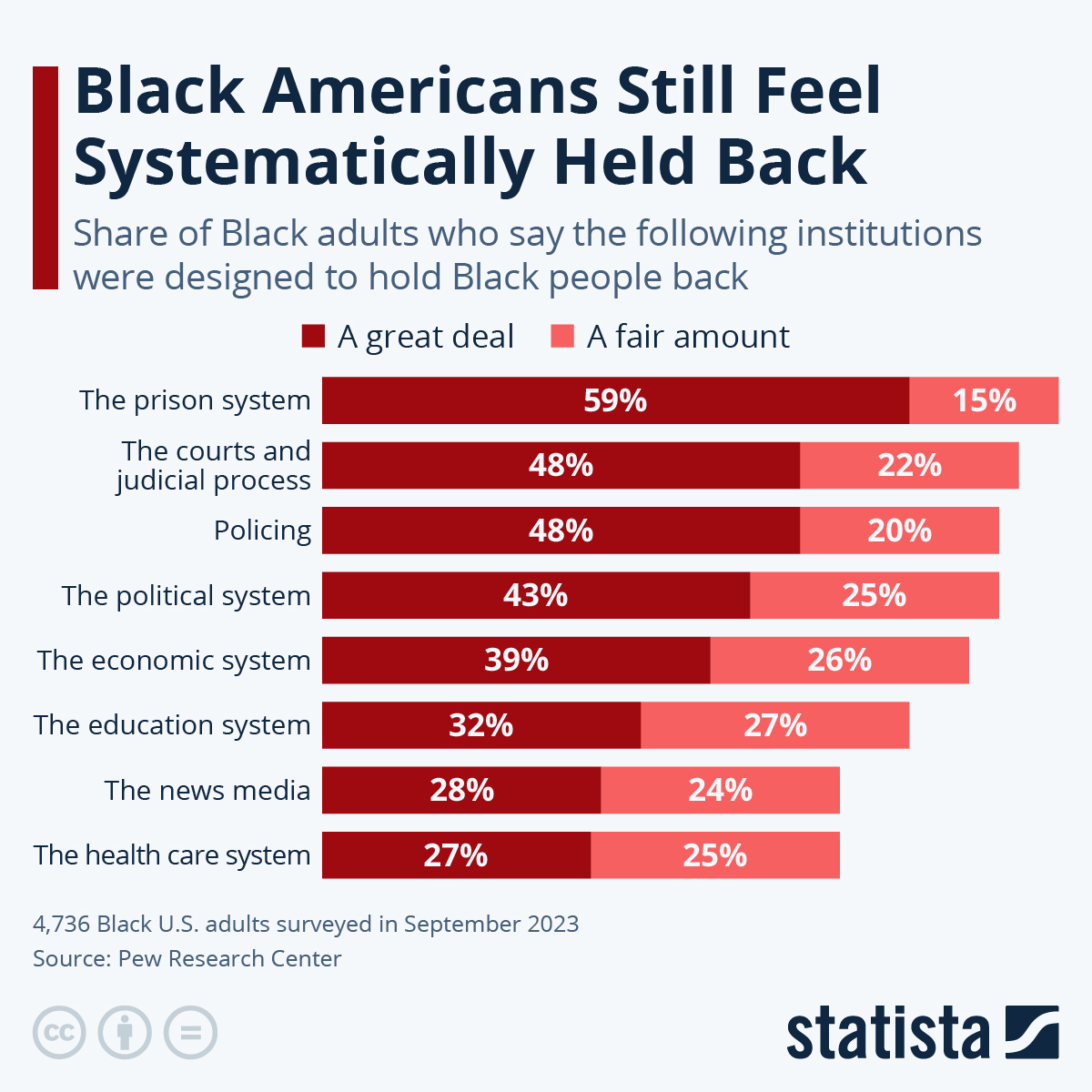
On July 2, 1964, Lyndon Johnson signed the Civil Rights Act into law.
To this day, the landmark bill is considered one of the most significant legislative achievements in American history, marking a key milestone in the country’s pursuit of racial equality. The bill outlawed discrimination based on race, color, religion, sex or national origin and mandated the end of racial segregation and discrimination in public accommodations, education and employment.
“We have talked long enough in this country about equal rights. We have talked for one hundred years or more. It is time now to write the next chapter, and to write it in the books of law,” President Lyndon B. Johnson said to members of Congress at the time, urging them to take action and pass the civil rights bill proposed by his predecessor John F. Kennedy, who had been assassinated the year before.
60 years later, Black Americans face a situation that is vastly improved compared to the systematic discrimination of the past, and yet, many racial disparities persist to this day.
As Statista's Felix Richter reports, whether it’s in terms of income, wealth, education, imprisonment or health outcomes – statistically, Black Americans fare significantly worse than Americans of other races and ethnicities. And while a recent Pew Research survey showed that 52 percent of U.S. adults think that the country has made a great deal or a fair amount of progress in ensuring equal rights for all people over the past 60 years, an equally high share of Americans agree that these efforts haven’t gone far enough.
You will find more infographics at Statista
Among Black Americans, the view on progress is much more negative with just 30 percent of respondents saying that significant progress has been made and 83 percent thinking that efforts to ensure equal rights have been insufficient.
Further highlighting the degree to which Black Americans feel discriminated against until this day, another Pew survey shows that the majority of Black adults don’t just feel treated unfairly out of negligence, they feel held back systematically across various U.S. institutions.
According to the September 2023 survey of 4,736 Black U.S. adults, 74 percent of respondents think that the U.S. prison system was designed to hold Black people back.
70 percent of respondents think the same of U.S. courts and the judicial system, while more than 60 percent think that policing, the political system and the economic system were designed to disadvantage Black Americans.
“Black Americans’ mistrust of U.S. institutions is informed by history, from slavery to the implementation of Jim Crow laws in the South, to the rise of mass incarceration and more,” the Pew Research Center writes, but it is also informed by personal experience. 75 percent of Black adults say that they’ve personally experienced discrimination or unfair treatment because of their race or ethnicity, and among the victims of discrimination 73 percent say that it made them feel like the system was designed to keep them down.
On July 2, 1964, Lyndon Johnson signed the Civil Rights Act into law.
To this day, the landmark bill is considered one of the most significant legislative achievements in American history, marking a key milestone in the country’s pursuit of racial equality. The bill outlawed discrimination based on race, color, religion, sex or national origin and mandated the end of racial segregation and discrimination in public accommodations, education and employment.
“We have talked long enough in this country about equal rights. We have talked for one hundred years or more. It is time now to write the next chapter, and to write it in the books of law,” President Lyndon B. Johnson said to members of Congress at the time, urging them to take action and pass the civil rights bill proposed by his predecessor John F. Kennedy, who had been assassinated the year before.
60 years later, Black Americans face a situation that is vastly improved compared to the systematic discrimination of the past, and yet, many racial disparities persist to this day.
As Statista’s Felix Richter reports, whether it’s in terms of income, wealth, education, imprisonment or health outcomes – statistically, Black Americans fare significantly worse than Americans of other races and ethnicities. And while a recent Pew Research survey showed that 52 percent of U.S. adults think that the country has made a great deal or a fair amount of progress in ensuring equal rights for all people over the past 60 years, an equally high share of Americans agree that these efforts haven’t gone far enough.
You will find more infographics at Statista
Among Black Americans, the view on progress is much more negative with just 30 percent of respondents saying that significant progress has been made and 83 percent thinking that efforts to ensure equal rights have been insufficient.
Further highlighting the degree to which Black Americans feel discriminated against until this day, another Pew survey shows that the majority of Black adults don’t just feel treated unfairly out of negligence, they feel held back systematically across various U.S. institutions.
According to the September 2023 survey of 4,736 Black U.S. adults, 74 percent of respondents think that the U.S. prison system was designed to hold Black people back.
70 percent of respondents think the same of U.S. courts and the judicial system, while more than 60 percent think that policing, the political system and the economic system were designed to disadvantage Black Americans.
“Black Americans’ mistrust of U.S. institutions is informed by history, from slavery to the implementation of Jim Crow laws in the South, to the rise of mass incarceration and more,” the Pew Research Center writes, but it is also informed by personal experience. 75 percent of Black adults say that they’ve personally experienced discrimination or unfair treatment because of their race or ethnicity, and among the victims of discrimination 73 percent say that it made them feel like the system was designed to keep them down.
Loading…





